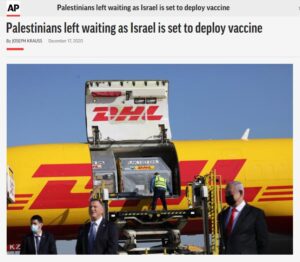- 623
- 632SHARES
Israel will begin rolling out a major coronavirus vaccination campaign next week after the prime minister reached out personally to the head of a major drug company. Millions of Palestinians living under Israeli control will have to wait much longer.
 According to the Oslo Accords, Palestinian authorities — not Israel — are responsible for the health care, including vaccines, of Palestinians living in the West Bank and Gaza Strip, a key fact completely concealed by the grossly misleading claim that “millions of Palestinians” are “living under Israeli control.” Palestinians in the Gaza Strip live under the Palestinian government ruled by Hamas, a designated terrorist organization. The vast majority of West Bank Palestinians live under the civilian and security control of the Palestinian Authority. (Despite the fact that Israel is not obligated to provide Palestinians with vaccines, Israeli officials have indicated that they will consider transferring any surplus doses to the Palestinians, a fact which AP did report.)
According to the Oslo Accords, Palestinian authorities — not Israel — are responsible for the health care, including vaccines, of Palestinians living in the West Bank and Gaza Strip, a key fact completely concealed by the grossly misleading claim that “millions of Palestinians” are “living under Israeli control.” Palestinians in the Gaza Strip live under the Palestinian government ruled by Hamas, a designated terrorist organization. The vast majority of West Bank Palestinians live under the civilian and security control of the Palestinian Authority. (Despite the fact that Israel is not obligated to provide Palestinians with vaccines, Israeli officials have indicated that they will consider transferring any surplus doses to the Palestinians, a fact which AP did report.)An Israeli security official indicated during a briefing with reporters last week that coordination on vaccines had been delayed due to a prolonged crisis between the PA and Israel. In May, Abbas announced that he was severing ties with Israel in protest of an Israeli plan to annex parts of the West Bank in accordance with US President Donald Trump’s controversial peace plan.
The annexation plan was officially shelved in mid-August due to Israel’s normalization accord with the United Arab Emirates, but Ramallah did not officially renew ties until US President-elect Joe Biden’s victory over Trump in the November elections.
“First we need to create a dialogue, and this is something which hasn’t happened,” the Israeli official told reporters last week, later adding: “We are still waiting for the Palestinian Authority to engage us in this matter. When they will engage us, we will start any process that will assist them.”
In these circles, in my experience, a distaste for Israel has come to be something between an acceptable prejudice and a prerequisite for entry. I don’t mean a critical approach to Israeli policies or to the ham-fisted government currently in charge in this country, but a belief that to some extent the Jews of Israel are a symbol of the world’s ills, particularly those connected to nationalism, militarism, colonialism, and racism … In this social group, this sentiment is translated into editorial decisions made by individual reporters and editors covering Israel, and this, in turn, gives such thinking the means of mass self-replication.
Physicians for Human Rights-Israel, a group that advocates for more equitable health care, says Israel has a legal obligation as an occupying power to purchase and distribute vaccines to the Palestinians. It says Israel must also ensure that vaccines that don’t meet its own safety guidelines — like the Russian shot — are not distributed in areas under its control.
“Israel still maintains control over many aspects of the Palestinians’ lives, whether checkpoints, importing goods and medication, and controlling the movement of people,” said Ghada Majadle, the director of the group’s activities in the Palestinian territories.
“The Palestinian health system, whether in the West Bank or the Gaza Strip, is in dire condition, mainly (because of) restrictions imposed by Israel.”
There is no shortage of Israeli legal or health authorities to rebut the unfounded claim that Israel has legal responsibility to purchase and distribute vaccines for Palestinians, but AP did not cite any. The Washington Post, in contrast, which also reported PHR-I’s argument, included a rebuttal from Israeli Health Minister Yuli Edelstein:
In an interview, Israeli Health Minister Yuli Edelstein rejected that argument. But he acknowledged that it was in Israel’s self-interest to expand vaccinations into an adjacent population that sends thousands of workers into Israel on a daily basis.
“There is no responsibility, but it is in our interest to help as far as the coronavirus is concerned,” said Edelstein, who was among Israeli leaders scheduled to be publicly vaccinated Saturday. “We’ve been doing it for the last year, with equipment and with medicine.”
In the latest iteration of the phenomenon described by Friedman — “a belief that to some extent the Jews of Israel are a symbol of the world’s ills” — Israel is to be blamed for the Palestinians’ delay in obtaining the vaccine, a shortage afflicting poor countries around the world, including those that don’t pour hundreds of millions of dollars into terrorism every year.

